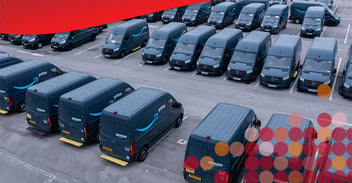How to Overcome Last Mile Delivery Challenges


Last-mile delivery handles the final stop between a distribution hub and a customer, arguably the most important leg of the journey. It involves navigating complex residential areas and making large amounts of deliveries quickly. The stakes are high when customers expect guaranteed same-day delivery and real-time visibility. Because of several common challenges, last-mile delivery requires advanced technology to make it all possible.
This article will briefly overview the last-mile delivery process before delving into its most common challenges. Further, we will introduce Tourmo AI-powered solutions to help enterprise organizations overcome these challenges while meeting and exceeding customer expectations.
What is Last-Mile Delivery?
Delivering packages from a distribution center to a residential address or other commercial location is known as last-mile delivery. This part of the process is regarded as the most difficult, owing to the sheer volume of individual deliveries made as well as the added complexity of delivering packages to a variety of locations, such as through crowded urban areas, down narrow, winding roads, up stairwells, or in areas with limited parking.
Because of the difficulties and costs associated with last-mile delivery, more businesses are turning to new technologies such as artificial intelligence (AI), automation, drones, robots, and even electric vehicles to help improve the cost-effectiveness and efficiency of their delivery operations.
Common Last-Mile Delivery Challenges
Last-mile delivery is a complex and difficult process that necessitates constant monitoring and scheduling, meticulous planning and coordination, and effective communication. Companies responsible for delivering goods to residential areas must ensure their delivery operations run as smoothly and efficiently as possible.
Proper preparation will require identifying potential challenges and taking proactive steps to address them before they become major service disruptions. For your consideration, we've listed some of the most common last-mile delivery challenges below.
On-Time and Same-Day Delivery
The ever-increasing demand for same-day and even same-hour delivery, combined with the need to meet and exceed customer expectations for quick and dependable service, places the greatest strain on last-mile delivery operations. Organizations needing to overcome these challenges must constantly seek new opportunities to cut costs and improve performance.
The unpredictability of same-day deliveries adds to the task's complexity because demand can vary depending on the season, week, or even hour. Managing and planning for these deliveries and ensuring necessary resources are readily available can be challenging, especially considering that delays or disruptions during the delivery process can affect the final delivery time.
Communication
Communication is a challenge in last-mile delivery when there is a lack of appropriate technology and software to facilitate communication between managers, workers, and customers worldwide and 24 hours a day, seven days a week.
Last-mile delivery relies on coordinating complex and unpredictable delivery processes between multiple parties. Therefore, an organization must provide the resources and tools necessary to support and facilitate these processes while ensuring accurate and up-to-date information is readily available and accessible to everyone involved.
Route Planning
Effective route planning (or route optimization) is critical for last-mile logistics delivery success. However, balancing competing objectives such as cost-effectiveness and on-time delivery is a complex process that requires ongoing management to minimize travel time, distance traveled, fuel consumption, vehicle wear and tear, and labor costs.
Further, uncontrollable factors such as traffic, weather, and road closures can lead to additional disruptions, making it even more challenging to plan efficient routes, reroute, and decrease the risk of service delays.
Visibility and Real-Time Tracking
High-level visibility and real-time tracking of delivery operations are challenging in last-mile logistics. This is partly due to the complexity of the delivery process and partly due to an organization's reliance on disparate systems and siloed data, making it difficult to gain visibility and verify the right resources are in the right place at the right time.
In other cases, visibility and real-time tracking can require a substantial upfront investment in technology and infrastructure, such as GPS tracking devices, IoT sensor technologies, mobile devices, and software that enables continuous monitoring and communication.
Higher Fuel Costs
Fuel price volatility makes it difficult for companies managing last-mile delivery operations to predict accurately and budget fuel costs. These price fluctuations can have a negative impact on companies’ ability to control expenses, resulting in decreased profitability.
Additionally, the high number of stop-and-go deliveries, which involve rapid decelerate, stop, and accelerate intervals, can reduce fuel efficiency. Last-mile deliveries commonly involve more miles, slower speeds, and more time on the road.

Tourmo’s AI-Powered Workforce Operations Solution
Artificial intelligence, machine learning, and automation are transforming the last-mile delivery process by increasing visibility, convenience, and control. Tourmo’s patented technology enables enterprise organizations to reduce costs, improve performance, and increase customer satisfaction. If your organization needs to improve its process structure or if you want to implement a more efficient, automated last-mile delivery process, Tourmo can help.
Tourmo's AI-powered Workforce Operations solution will track and verify mobile workforce operations around the clock, providing all managers and stakeholders with complete visibility of their mobile fleets. Tourmo automates your entire plan, monitors worker progress, and makes changes as needed. It does all this while continuously updating your mobile workforce and consumers to ensure compliance and satisfaction.
Our Workforce Operations solution will also track whether work is completed as planned, notify clients when something changes, and take action via automated workflows. These features make it easy to identify and manage issues like delays at client sites, unplanned stops, route deviations, and out-of-sequence deliveries, with features that include:
- Accurate event data, normalization, contextualization, and advanced route reasoning to remove inaccuracies
- Real-time monitoring of job progress and delivery estimates
- Real-time ETA
- Automated progress updates
- Activity and inactivity monitoring
Overcome Last-Mile Delivery Challenges With Tourmo AI
According to experts, organizations will continue to overcome the significant challenges associated with last-mile delivery that hinder excellent customer service thanks to the advantages offered by intelligent solutions. The gap between higher costs, inefficiencies, and success can be closed by implementing an AI-powered, automated solution like Tourmo AI.
Tourmo will support your company if it is just starting its digital transformation journey or wants to improve its existing last-mile delivery operations. Tourmo AI-powered solutions can upgrade and maximize the value of your existing technology investments while improving how you track, verify, and manage operations, significantly increasing efficiency and productivity.
Tourmo AI's implementation is fast and easy, requiring no expensive rip and replace and yielding an ROI of up to 10x in just two to four months after deployment. If you’d like to learn more about how Tourmo can help you overcome last mile delivery challenges and maximize your existing solutions with automated, AI-powered insights, ,Contact us today!
Share this article:

Matt Braun
Matt Braun leads the Solutions Consulting team at Tourmo. He helps Tourmo customers better understand their challenges and uncover creative, efficient solutions to improve their operations. He guides them through the benefits provided by mobility workflow automation, AI-powered tools and reports, and the value of data science. Matt’s focus on clear, actionable, and effective information is foundational to all prescribed solutions. Matt came to Tourmo after 15 years as Sr. Director of Performance Improvement at First Student –– an organization operating a fleet of more than 40,000 vehicles. He holds a Bachelor of Business Administrations from the University of Cincinnati and a Masters of Business Administration from Thomas More College. Matt and his wife live in the Cincinnati area where Matt coaches most of the sports of their 2 sons and daughter.





